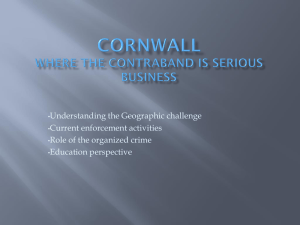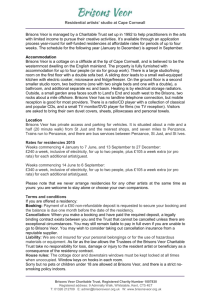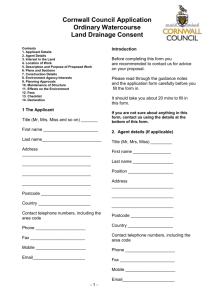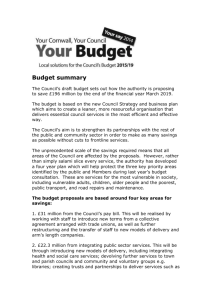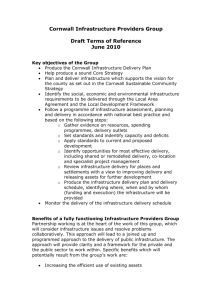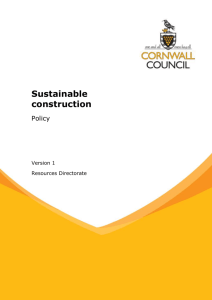regionsofculture
advertisement
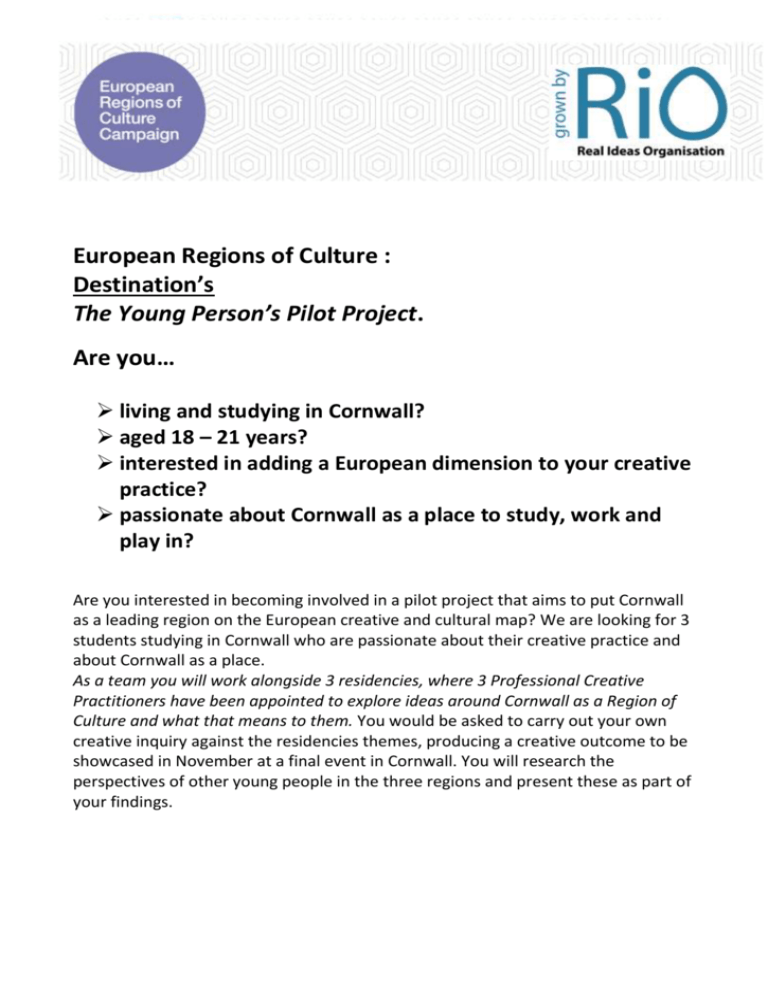
European Regions of Culture : Destination’s The Young Person’s Pilot Project. Are you… living and studying in Cornwall? aged 18 – 21 years? interested in adding a European dimension to your creative practice? passionate about Cornwall as a place to study, work and play in? Are you interested in becoming involved in a pilot project that aims to put Cornwall as a leading region on the European creative and cultural map? We are looking for 3 students studying in Cornwall who are passionate about their creative practice and about Cornwall as a place. As a team you will work alongside 3 residencies, where 3 Professional Creative Practitioners have been appointed to explore ideas around Cornwall as a Region of Culture and what that means to them. You would be asked to carry out your own creative inquiry against the residencies themes, producing a creative outcome to be showcased in November at a final event in Cornwall. You will research the perspectives of other young people in the three regions and present these as part of your findings. Your creative work or study can be in any media including text, language and stories, craft, fine art, visual arts, performing arts, music and time-based media including film, photography, video and digital. You will need to be willing to commit to the whole programme between March and November 2009. However this is an exciting opportunity to develop your skills, work alongside professional practitioners and be part of an innovative European programme. The task: You will need to: Have full commitment to the whole project from March – November 2009. Carry out a personal and team enquiry. Work as a team to plan and develop the project. Participate in the Poland, Finland and Cornwall weeklong residencies. Maintain a record of your findings and learning journey, perhaps by blog or travel diary. Produce a creative outcome to be showcased and presented at the final event in November. 2009 Event/Residency Kujawsko-Pomorskie (Poland) South Ostrobothnia (Finland) Cornwall (UK) 4 days, between 17 - 24 April 4 days, between 2 - 7 August 6 days, 8 - 13 November Eligibility Criteria The applicant must: Live and study in Cornwall Be aged between 18 and 21 years Be interested in being part of a European pilot research project and able to incorporate it as part of your personal inquiry for your course Be interested in communicating with young adults in Cornwall, Finland and Poland Be passionate about Cornwall as a region Available to participate in a yearlong creative research project, including 2 visits abroad, and able to attend all of the advertised dates In possession of a passport We are looking for: Commitment and enthusiasm Able to work well in a team and independently An ability to communicate your ideas in a creative, and unique way to a wide audience This project is open to all applicants and has a commitment to equal opportunities for all. Expenses Participation in the project is on an unpaid, voluntary basis. The participants will be encouraged to use low-carbon modes of travel – boat, rail and road – between the regions and these journeys themselves may become part of their inquiry. Agreed travel, accommodation & subsistence costs will be paid where necessary. Application process The application process is in two stages. Please fill out the application form. If short-listed, candidates will be asked to do a short presentation in their own style of 10 minutes, as to why participation in this project would be important for them and on behalf of young people in Cornwall. You will also be asked to create a postcard in your own style about Cornwall and what it means to you, which you can bring with you to the interview. For an application form, please email Sarah Waller at sarah.waller@realideas.org . Closing date for applications is Monday 2nd March 2009. Interviews Shortlisted applicants will be notified by Thursday 5th March 2009. Interviews will take place on: Thursday 12th March 2009. Background Information - 2009 Pilot Project Residencies European Regions of Culture The European Regions of Culture Campaign Organisation (EROCCO) is an organisation based in Cornwall which is arguing the case for a new culture designation for rural regions: European Regions of Culture (EROC). As Capitals of Culture celebrates urban European living, our goal is to harness rural culture to create a better, more sustainable future for partner regions individually, collectively and in Europe as a whole. Partners Cornwall (UK) Kujawsko-Pomorskie (Poland) South Ostrobothnia (Finland) The Residency Programme Each of the partner regions has recruited 3 Creative Practitioners (9 in total) to undertake a pilot residency project in 2009. A cultural event is being hosted by each of the three regions during 2009, each with a different theme. The 9 Creative Practitioners will undertake a residency during each event in each region, working with the different themes. The Practitioners’ inquiries will then be presented or exhibited on the final day of each event. Youth Participation We are seeking 6 young people who can also become engaged with this programme. Programme Dates 2009 Event/Residency Kujawsko-Pomorskie (Poland) 8 days, 17 - 24 April Theme Community & Internationalism South Ostrobothnia (Finland) Cultural Economy & Entrepreneurship 6 days, 2 - 7 August Chinese students visit Aug tbc TBC Cornwall (UK) 6 days, 8 - 13 November Regional Distinctiveness & Environment Agents of Inquiry The Practitioners will work as agents of inquiry as much as makers of things. The aim of the residencies is to celebrate and showcase cultural excellence, originality and innovation in these regions. Practitioners can come from any area of cultural activity, including text, language and stories, craft, fine art, visual arts, performing arts, music and time-based media including film, photography, video and digital. The Practitioners may work exclusively in one discipline or combine different approaches. They may draw on traditional, contemporary or technology based practices or activities. They should engage bravely with a process of risk and experiment to develop their own practice during this project. Each Practitioner will create 3 pieces of work, one during each residency in each region. Their work may develop as it travels to each region or it may be 3 different pieces of work, one in each region. Their encounters will be with the familiar and the new, reflecting differences and similarities. Developing links between the 3 regions will be encouraged. The Practitioners may work individually or collaboratively. The Practitioners must be open to interaction and discussion with others involved in this project. The Creative Producer will facilitate their work to ensure the 9 Practitioners’ approaches contrast with and complement one another. The Practitioners collective responses will build to a compelling narrative in 27 parts. This body of work from the pilot residencies will be used as the central argument to prove the case for EROC status by significantly embedding rural and regional culture within wider society. It may also be the catalyst for longer term projects. Lines of Inquiry Each Practitioner will pursue the core theme via a specific line of inquiry sparked by partnering with a company, organisation, institution, landscape, policy document or place significant to the theme in each region. The Practitioners will be invited to explore models for production and living beyond those driven by urban and primarily economic values. Questions about cultural capital and alternative currencies, developing spiritual goods within economics and creative responses to the future challenges we all face will be raised. The Practitioners should draw on cultural references from within these regions to generate dialogues about who we once were through atavistic links and a re-engagement with the natural world through to questions about who we are now and who we may become. Forms of Inquiry The Practitioner may approach this residency through any medium. They should utilise materials, resources, rituals, symbols or objects particular to the place or involve actions rooted in a specfic location. They may also engage with related areas of activity: local customs and sports, spiritual and philosophical practices and the culture of the land itself. The residencies will encourage the participation of the local communities and seek to engage with a broad spectrum of people, young and old, by appealing to the senses and the soul as much as the intellect. Practitioners may invite people to take part in the creation of the work. The residencies should include activities that animate the theme, such as story-smithing, environmental art schools, workshops, interactive and live performances, instigating actions, installations, exhibitions or structural works. The work may be the start of an ongoing process that individuals or groups can continue to build on like a story circle, sculpture trail, mnemonic field or symbolic planting.
